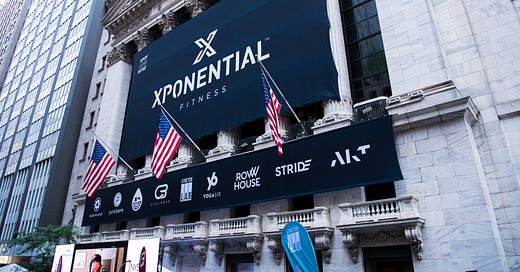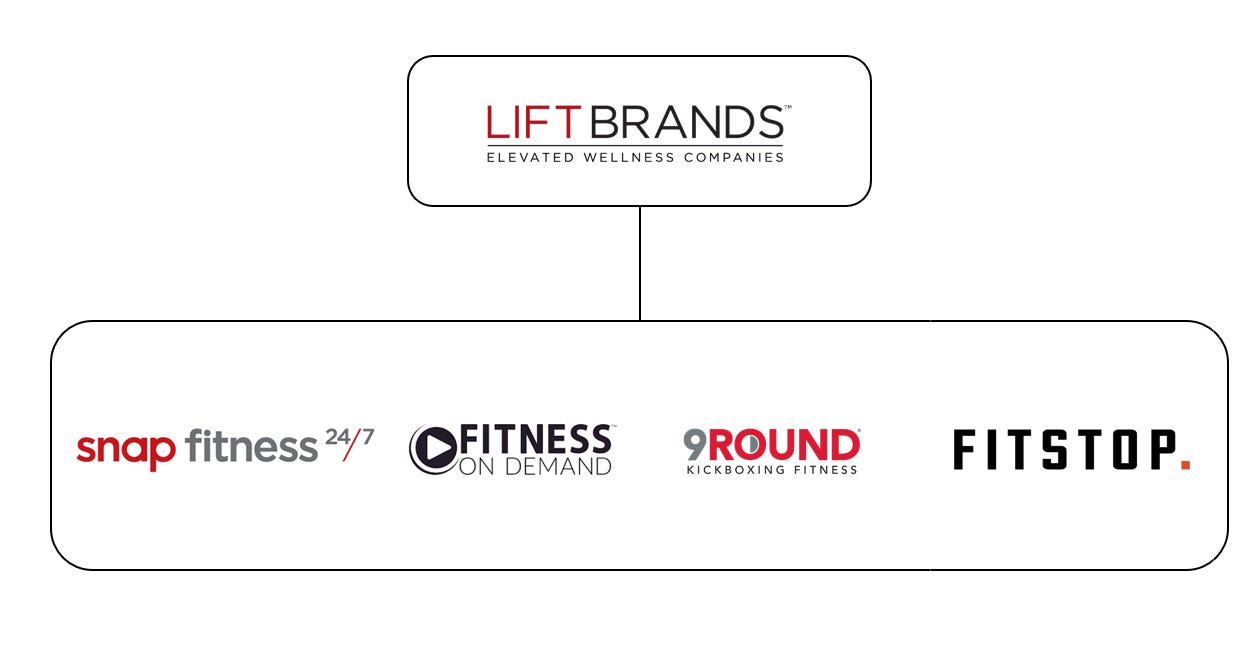For those of you reading for the first time, welcome to Sweat Ventures. I write every other week on themes that catch my eye in the world of Fitness and Sports Investing.
Introduction
In my last post (Private Equity x Franchise Gyms), I discussed how many private equity groups are rolling up and consolidating franchisees of big-box fitness gyms. A distinct but related strategy that I’d like to explore in this post is the acquisition of the franchisor itself, and even more so, the acquisition of multiple franchisors within a single holding company. This is a unique way that private equity firms are gaining exposure to the fitness industry while diversifying risk away from a singular trend or brand. Let's dive into it.
Thesis
To start off, let’s briefly discuss the relationship between a franchisor and franchisee, irrespective of the fitness industry. The franchise business model is a growth strategy in which a company (the franchisor) licenses its brand, business systems, and intellectual property to independent operators (the franchisees). In exchange, franchisees pay initial fees and ongoing royalties (normally 7-10% of revenue plus a 2% marketing fee) to operate under the franchisor’s established brand name.
There are pros and cons to investing at both the franchisor and franchisee levels. As discussed in the previous post, franchisee investment can be attractive because you are buying into an established brand that you’d otherwise have to build from scratch. You can leverage the larger franchisor corporate infrastructure, reducing development costs for marketing, technology, and operational systems. Acquiring or building under a franchise banner is more accessible from an overall cost standpoint, which is why it is often an attractive option for individual owner/operators.
Sitting in the franchisor seat, the model can be extremely attractive as well. It allows for scalability, capital efficiency, and recurring revenue streams. You build the brand once, and then offload a lot of the new development investment burden and risk to a franchisee. The royalty payments are a strong recurring revenue stream, and a growing franchisee base creates network effects within the brand.
I’ve observed numerous investment groups building a portfolio of fitness and/or health and wellness franchisors within a single holding company. These portfolio companies are either developed in-house or acquired from other operators. A few key components of the thesis include:
Shared Services & Centralized Infrastructure: Under a franchise banner, key functions such as marketing, franchise development, legal, technology, and customer service can be centralized. This is even more pronounced with a holding company, in which these capabilities are not only shared between franchisees but often between different franchisor brands. The result is an improved margin profile across the system.
With scale, there is a breakeven point at which it makes sense to develop proprietary, in-house systems. WellBiz Brands (discussed more below) developed WellBizOne for their five franchisor brands. WellBizOne is a proprietary system that enhances studio operations and member engagement through a unified scheduling, CRM, marketing, POS, and reporting tool. The development and maintenance costs of this system are effectively shared across 1,000 different franchise locations and 5 brands.
Cross-Brand Promotional Opportunities: With a consistent customer demographic, a multi-brand portfolio can lead to larger customer wallet share through cross-promotional efforts, bundled memberships, and loyalty programs. WellBiz Brands targets a high-income female demographic across its salon, lash, massage, and fitness concepts. Because these brands all offer distinctive services, WellBiz can cross-promote without the risk of cannibalization.
Similarly, Xponential Fitness offers digital subscriptions to its boutique fitness offerings on an individual basis as well as an all-access package across brands, allowing consumers to flexibility to try new fitness concepts while reducing the churn risk.
Diversification Across Concepts: Fitness and Health/Wellness concepts are generally exposed to trends and fads. What is in and popular this month can just as quickly become unpopular next month. This risk is particularly relevant for consolidators at the franchisee level, who sign franchise agreements that generally prevent owning other, competing brands. Having multiple concepts under one holding company helps to diversify away this risk.
Franchisee Pipeline: From the franchisor's seat, the customer acquisition cost can be evaluated from an actual underlying end-customer perspective. But equally, if not more important, is the customer acquisition cost of new franchisees. Once a franchisee has been vetted and a track record proven, there is an opportunity to sell multiple franchises to the same operator, either within the same brand or across brands. As of 2024, 83% of licenses for Xponential Fitness brands are held by multi-unit owners. Of those with multiple units, 46% of franchisees own studios across multiple brands.
Purchasing Power: Increased scale allows for more purchasing power with vendors and suppliers, and the potential to have better ownership of the supply chain. XPOF stated in their 2024 10K, “as one of the leading franchisors in the industry, we have significant scale that enables us to negotiate competitive pricing from our suppliers. As a result, we believe that we offer equipment at more attractive pricing than franchisees could otherwise procure on their own, lowering the build-out cost and improving unit economics.
The scale of WellBiz Brands has allowed them to go a step further and own elements of their supply chain. WAVE is a 21,000-square-foot company-owned distribution center that supplies franchisees with necessary products and equipment. This helps ensure supply chain control and speed to market new products.
Platform Arbitrage: Finally, there is simple platform arbitrage when looking at valuation multiples. Smaller concepts can be developed in-house relatively cheaply or acquired for 5-7x EBITDA. A combined platform trades for closer to 10-12x EBITDA. XPOF, the only publicly traded fitness holding company that I evaluated, traded at 17.87x EV/TTM EBITDA as of 4/17.
Key Risks
Some of the key risk considerations that a franchisor holding company strategy faces include:
Market Confusion and Cannibalization: If the various franchisor concepts are too distinct or not complementary, there is potential for cannibalization and market confusion. Franchisees could be hesitant to enter a franchise agreement if their exclusive territory does not protect them against the encroachment of a related and competing brand. The acquisition or launch of a new concept can steal market share from an existing brand and lead to confusion if the brands have conflicting values or appearances.
Franchisee Dependence: Beyond what is outlined in the franchise agreement, franchisees tend to have significant autonomy in their business operations. The franchisor faces legal and reputational risk if franchisees do not maintain their business to brand standards. The bad actions of one franchisee can adversely affect the reputation of the system as a whole.
Interbrand Dependence: Very related to the above point, despite the fact that the brands operate as their own legal entities, there is a level of interbrand dependence when customers are aware of the shared ownership. A major lawsuit at a Club Pilates location can reflect poorly on the other brands in Xponential Fitness’ portfolio, such as Cycle Bar, Pure Barre, Stretch Lab, etc.
Case Studies
Xponential Fitness
Xponential Fitness is the largest and most widely known multi-brand fitness holding company. Founded in 2017 and based in Irvine, CA, the publicly traded Xponential Fitness (XPOF) has acquired and developed 8 brands in the fitness, health, and wellness industry. The company has over 3,150 studios within its system, with locations in 49 states and 27 countries. Xponential’s portfolio currently consists of the following brands:
Club Pilates: Reformer-based, full-body Pilates workouts designed to increase mobility, balance, and strength for all fitness levels.
Cycle Bar: Indoor cycling studio delivering high-energy, music-driven classes focused on community, performance tracking, and self-discovery.
Pure Barre: Musically-driven, low-impact, high-intensity group classes that blend Pilates, yoga, and ballet-inspired movements to strengthen and tone the body in under an hour.
Stretch Lab: One-on-one, customized assisted stretching sessions led by trained Flexologists to improve flexibility and mobility.
Yoga Six: Accessible, energizing, and empowering yoga classes through six core formats designed for all experience levels.
Body Fit Training: Science-backed, progressive group strength and conditioning programs led by accredited coaches using innovative technology for all fitness levels.
Rumble: Boxing-inspired, full-body group fitness classes combining boxing, HIIT, and strength training in a high-energy, music-fueled environment.
Lindora Weight Loss and Wellness offers personalized, medically guided weight loss programs—with and without GLP-1 medications—focused on a ketogenic, low-carb nutrition plan and holistic lifestyle support.
Self Esteem Brands
Founded in 2022, the Woodbury, Minnesota-based Self Esteem Brands has over 5,500 franchise locations across its 6 brands in 42 countries. The company states a mission to"improve the self-esteem of the world, by enriching the lives of consumers, employees, franchisees, and communities through its health and wellness brands.” Self Esteem’s portfolio consists of the following brands:
Anytime Fitness: 24/7 access to thousands of gyms worldwide, offering personalized support, a welcoming community, and flexible workout options for all fitness levels.
Orange Theory: 60-minute, coach-led group workouts that combine rowing, cardio, and strength training, using heart rate monitors to maximize calorie burn and track effort through targeted heart rate zones.
Basecamp Fitness: Efficient 35-minute high-intensity interval and functional training sessions that alternate between air bike cardio and strength exercises.
The Bar Method: Ballet-inspired fitness studio featuring classes that sculpt, tone, and elongate muscles through a series of strengthening and stretching exercises designed to create a lean, dancer-like physique.
Stronger U Nutrition: Personalized, sustainable nutrition coaching that focuses on long-term lifestyle changes and flexible eating habits, guided by expert coaches.
Waxing the City: Expert facial and body waxing services performed by highly trained Cerologists in a welcoming studio environment focused on client comfort and self-confidence.
Lift Brands
Lift Brands, founded in 2014 and based in Chanhassen, Minnesota, has over 2,000 franchise locations in 26 countries across its 4 portfolio brands. The company raised $200M from Private Equity firm TZP Group in 2014, with an objective of scaling their existing brands along with acquiring new concepts in their holding vehicle. Brands include:
Snap Fitness 24/7: Convenient, affordable gyms with 24/7 access, industry-leading cardio and strength equipment, and a supportive, inclusive atmosphere for all fitness levels.
Fitness on Demand: Streaming platform and in-club system providing access to thousands of high-quality workouts, mindfulness sessions, and wellness content anytime, anywhere, with personalized recommendations and community engagement.
9Round Kickboxing Fitness: Unique, trainer-led 30-minute circuit workout combining kickboxing, strength, and cardio at nine stations, designed for all fitness levels with no set class times and real-time heart rate tracking.
Fitstop: Progressive, coach-led group training sessions focused on strength, conditioning, and athletic performance using functional movements and compound lifts to help members move, feel, and look better.
WellBiz Brands
WellBiz Brands was founded in 1983 in Denver, Colorado, and is backed by private equity powerhouses, KSL Partners, Golub Capital, and BlackRock. The company has an estimated $500M in systemwide sales. Brands in the WellBiz Brands portfolio include:
Amazing Lash Studio: Customized, lightweight eyelash extensions and lash services in a tranquil, private studio environment to enhance natural beauty with a comfortable, professional experience.
DryBar: Expert blowouts delivering stylish, salon-quality hair styling focused solely on wash-and-blow-dry services to create polished looks without cuts or color.
Elements Massage: Personalized, therapeutic massage sessions tailored to individual needs in a relaxing, spa-like setting to promote wellness and stress relief.
Fitness Together: Personalized, one-on-one personal training programs with customized workout plans and ongoing progress assessments, emphasizing accountability and long-term health goals.
Radiant Waxing: Premium, full-body waxing, brow, and lash services performed by extensively trained Waxologists using proprietary soft wax for a comfortable, efficient, and inclusive beauty experience.
Conclusion
As I’m hopefully highlighting through this series of posts, there are different strategies that private equity groups pursue to gain exposure to the rapidly expanding fitness industry, particularly as it relates to the franchise model. You can either build a portfolio of multi-unit franchisees or a portfolio of multi-brand franchisors.
In my final post of this series, I’m going to highlight FitLab, which is taking a varied approach to acquiring not only boutique fitness brands but also integrating equipment and apparel manufacturers within their holding company. Thanks, as always, for reading.








